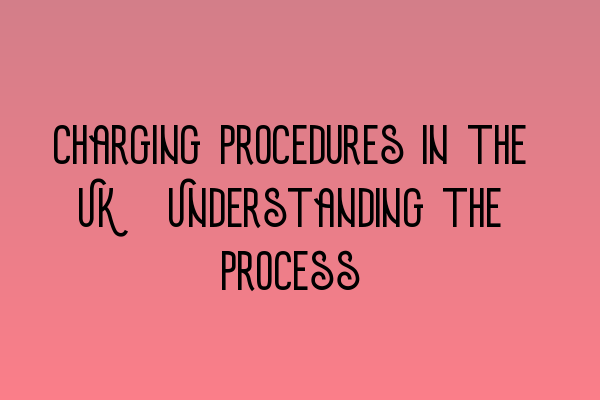Charging Procedures in the UK: Understanding the Process
Welcome to SQE Criminal Law & Practice Law UK, your go-to source for all things related to criminal law and practice in the UK. In this comprehensive guide, we will walk you through the charging procedures in the UK and help you understand the intricate process involved. Whether you are studying for the SQE exams or simply looking to enhance your knowledge, this article will provide you with the essential information you need.
What are Charging Procedures?
Charging procedures refer to the formal process followed by authorities when laying charges against an individual or an organization suspected of committing a criminal offense. These procedures ensure that all the necessary legal steps are taken under the relevant legislation, and that the accused is afforded their rights throughout the process.
It is essential to have a thorough understanding of charging procedures, as they form the foundation of the criminal justice system in the UK. By knowing the steps involved, you can better navigate through the legal processes and build a solid defense for your clients.
The Process of Charging
The charging process typically consists of the following stages:
- Investigation: Law enforcement agencies conduct a thorough investigation to gather evidence and determine if a crime has been committed. This may involve collecting witness statements, analyzing forensic evidence, and interviewing suspects.
- Arrest: If the evidence supports the suspicion of a crime, the authorities may proceed with the arrest of the suspect. This involves taking the person into custody and informing them of their rights.
- Interview: Once arrested, the suspect is usually interviewed by the police. It is important for individuals to seek legal representation during this stage to ensure their rights are protected and to assist in formulating their defense.
- Evidence Review: Following the interview, the Crown Prosecution Service (CPS) reviews the evidence collected. They assess the strength of the case and determine whether there is enough evidence to proceed to court.
- Charge: If the CPS is satisfied that there is sufficient evidence, they will formally charge the suspect with the relevant offense. This is usually done in writing and outlines the specific charge(s) against the individual or organization.
- Court Proceedings: Once charged, the case will proceed to court. The defendant will have the opportunity to enter a plea, and if necessary, a trial will be scheduled. The court will then decide whether the accused is guilty or not guilty based on the evidence presented.
It is important to note that each case is unique, and the charging procedures may vary depending on the nature and complexity of the offense. Therefore, it is crucial to seek legal advice from qualified professionals who can guide you through the specific details of your case.
Importance of Understanding Charging Procedures
Understanding charging procedures is vital for anyone involved in criminal law and practice. Whether you are a law student preparing for the SQE exams or a legal professional, having a comprehensive understanding of the process ensures that you are well-equipped to defend your clients effectively.
By understanding the charging procedures, you can:
- Advise clients on their rights and obligations during the investigation and charging process.
- Identify any procedural irregularities or errors that may lead to a dismissal of charges or reduced penalties.
- Effectively analyze the evidence presented by the prosecution and develop a well-grounded defense strategy.
- Ensure compliance with legal and ethical obligations while representing your clients.
At SQE Criminal Law & Practice Law UK, we offer a range of comprehensive SQE 1 and SQE 2 preparation courses designed to equip aspiring solicitors with the knowledge and skills necessary to navigate through the complexities of criminal law. As part of our preparation courses, we cover in-depth topics such as charging procedures, criminal trial process, evidence gathering, and much more.
For additional practice and self-assessment, we recommend exploring our SQE 1 Practice Exam Questions and SQE 1 Practice Mocks FLK1 FLK2. These resources will help you reinforce your knowledge and test your understanding of the charging procedures in a simulated exam environment.
If you are preparing for the SQE exams and looking for comprehensive preparation courses, we invite you to explore our range of SQE 2 Preparation Courses and SQE 1 Preparation Courses. Our expert tutors and extensive study materials will ensure that you are well-prepared for the challenging exams ahead.
Stay updated with the latest SRA SQE Exam Dates and important announcements by regularly visiting our website. We are dedicated to providing the most up-to-date information to help you succeed in your legal career.
Thank you for choosing SQE Criminal Law & Practice Law UK as your trusted resource. We are here to support your journey towards becoming a successful solicitor, and our team is always available to assist you with any queries you may have. Stay tuned for more informative articles!
